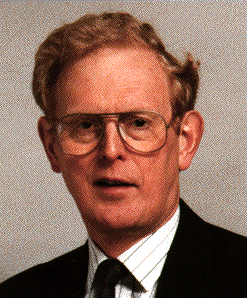
Remembering Ian Wand (1941-2020)
Posted on 21 July 2020

Ian joined the University in the early 1970s and was the first Head of the Department of Computer Science in 1983 on its foundation. By present standards, the start of the Department of Computer Science was extraordinary – about 20 students admitted each year, a small building, a Head of Department shared with the Computing Service, and a general feeling, even at the highest levels of the University, that the study of computers was but one step removed from the study of lawnmowers.
Ian was not only a wonderful academic, leading the team that built one of the first compilers for the Ada programming language, he proved a superb administrator, starting the process of building the Department up to the size, scale and reputation it enjoys today. He understood immediately the importance of a strong research environment (even before research assessment exercises, for which he would later become a superb panel chair, were envisaged), and used the Department’s research reputation to attract large numbers of well-taught, able students. He was able to navigate the world of the University without any desire for self-aggrandisement, but through the deployment of logical arguments designed to attract more staff, students, money and reputation to the benefit of the subject and Department he loved.
As Deputy Vice Chancellor - part-time at that point - his many contributions included leading research selectivity exercises across campus, investigating forensically the IAAS, and both helping to establish and then implementing the successful plan for the Hull York Medical School.
Ian was a great colleague, always involved, interested, wise, caring, compassionate and dedicated to the University; and his love of good music was proverbial. Even in retirement Ian retained a keen interest in the fortunes of computer science as an academic discipline, the health of the university sector as a whole, and York in particular. He was never partisan, but only interested in understanding the logic of any situation and its consequences. He was a rare and special person, a wonderful colleague and true friend. We shall always remember him.
Further details of Ian's career
When Ian retired from the University of York in 2002, the following article was written by friend and colleague Bill Freeman for the Department of Computer Science Newsletter:
Ian Wand was given a cheerfully noisy send-off by members of the Department of Computer Science, past and present, at the end of September 2002. An a capella group of voices reviewed his career in a sequence of numbers including `To our Noble Board of Directors' from the IBM Songbook, and he was given a garden seat on which to sit and Think. Ian's retirement had come after thirty years here during which his contributions to the Department, the University of York, and the academic study of Computer Science nationally, had been profound. Ian spent his last year here getting the Hull-York Medical School (HYMS) up and running, from the York end. He had been Pro and then Deputy Vice-Chancellor since 1995, and, at national level, was Chair of the Computer Science Panel in the 2001 Research Assessment Exercise (RAE).
Born in Lincolnshire in 1941, Ian studied Physics at the University of Leicester, obtaining his PhD in 1962. In 1965, he became a Lecturer in Radio Physics, with an interest in ionospheric propagation, before turning to Software Engineering - a topic in which he was to make his name. After working at the IBM Research Laboratories at Hursley in Hampshire from 1969, he came to York as a Lecturer in Computer Science in 1972 and was appointed to a personal chair in 1984. Ian's main interest, within Software Engineering, was in the design and construction of compilers and support systems for high-level languages - initially PL/1 and then, most significantly, Ada. Ian was involved internationally in the design of Ada itself and then, at York, directed the development of the York Ada Compiler system, which was the only one of its kind produced entirely within the UK. He was Head of Department from 1983 to 1992, following which he spent a year at the Joint Research Centre of the European Communities, Ispra, Italy.
During his time in the Department, as it grew from six to more than thirty teaching staff, Ian was responsible for raising its level of research from nearly nothing to its present eminence, and was a member of many committees of SERC, the DTI, IEE and BCS, representing the Department, the University, or the discipline of Computer Science in the UK. The latter included two visits to Japan to evaluate Japanese Software Engineering (1990 and 1994). The Department's rating of 5* in the two most recent RAEs owes much to Ian's early and continuing efforts and leadership. Ian was also the founder and course director of the Department's advanced MSc courses in Safety Critical Systems Engineering (1994), and in Software Engineering (1997).
After seven years as Pro and then Deputy Vice-Chancellor, and working on the establishment of HYMS, Ian retired from the University, finally and completely, in September. In November, he was awarded an Emeritus Chair by the Senate of the University of York.
He continues to live in York, near the York District Hospital, `opposite the mortuary' as he is so fond of saying. He and his wife Helen, who is a retired teacher of English, spend much of their time visiting their children Paul, in Scotland, and Celia, in London, and also their three grandchildren. Ian (piano), Paul (piano) and Celia (violin) are all excellent amateur musicians, so one must not see Ian as having nothing to do when he is not doing a little light consultancy to keep his hand in. Also, Ian and Helen visit Italy frequently, to keep in touch with the friends they made there, and they take their summer holidays in Orkney by way of contrast and to escape global warming. At his farewell reception, in his farewell speech, he kindly hoped and expected that we too should fare well, and said that he would look up to Heslington from the Huntington Road with interest, a little envy, and some pride. Oh, and he encouraged us to carry on interviewing on Saturdays.
